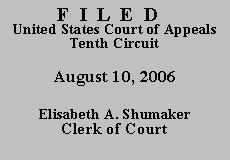

| UNITED STATES OF AMERICA,
Plaintiff-Appellee, v. CARL G. TERRELL, Defendant-Appellant. |
(D.C. No. 97-CR-10061-MLB)
|
The defendant appeals the district court's dismissal of Fed. R. Civ. P. 60(b) motion in which he sought reconsideration of the denial of his previously filed 28 U.S.C. § 2255 motion. We vacate the order for lack of jurisdiction, construe the defendant's notice of appeal, motion to proceed in forma pauperis, and appellate brief as an implied application for authorization to file another § 2255 motion, and deny authorization.
The defendant's original § 2255 motion was denied by the district court. On appeal, this court denied a certificate of appealability. See United States v. Terrell, 6 Fed. Appx. 763 (10th Cir. 2001) (unpublished). Subsequently, the defendant filed the Rule 60(b) motion which is the subject of this appeal, arguing that the evidence was insufficient, that one of the statutes he was convicted of violating, 18 U.S.C. § 922(g)(3), is unconstitutional, that the criminal judgment is void, and that recent cases from other circuits show that the district court and this court erred in their decisions in the earlier § 2255 proceeding. The district court dismissed the motion for lack of jurisdiction. (The court should have transferred the matter to this court as a successive § 2255 motion. See Coleman v. United States, 106 F.3d 339, 341 (10th Cir. 1997)).
The Rule 60(b) motion constituted a successive motion under the Antiterrorism and Effective Death Penalty Act. See, e.g, United States v. Torres, 282 F.3d 1241, 1246 (10th Cir. 2002) ("[T]o allow a petitioner to avoid the bar against successive § 2255 motions by simply styling a petition under a different name would severely erode the procedural restraint imposed under 28 U.S.C. §§ 2244(b)(3) and 2255.") (citing to Lopez v. Douglas, 141 F.3d 974, 975 (10th Cir.) (holding that a post-judgment Rule 60(b)(6) motion, filed in a habeas proceeding, should be treated as "a second habeas petition under the Antiterrorism and Effective Death Penalty Act ....").
The Supreme Court's recent decision in Gonzalez v. Crosby, 125 S. Ct. 2641, 2648, 2651 (2005) (holding that a Rule 60(b) motion filed in a § 2254 case must be treated as a successive habeas petition if it asserts or reasserts a substantive claim to set aside the petitioner's state conviction, as opposed to asserting a defect "in the integrity of the federal habeas proceedings"), does not change this result.
Even if we could assume that Gonzalez applies to § 2255 proceedings, see United States v. Scott, 414 F.3d 815, 816 (7th Cir. 2005) (extending the reasoning of Gonzalez to § 2255 motions which implicate similar concerns of successiveness), the defendant's Rule 60(b) motion does not assert a defect "in the integrity of the [previous] federal habeas proceeding[]." Rather, the grounds presented are alleged errors which occurred as part of the defendant's trial, and are reassertions of grounds previously raised.
Accordingly, the district court lacked jurisdiction over the motion, and the district court order must be vacated. See Lopez v. Douglas, 141 F.3d at 975-76. However, we will construe the defendant's notice of appeal and appellate brief as a request for the required authorization. Id.
We have thoroughly reviewed the matter and conclude that the defendant has failed to make the prima facie showing required by § 2255 as amended by the Antiterrorism and Effective Death Penalty Act. His contentions are not based on newly discovered evidence that, "if proven and viewed in light of the evidence as a whole, would be sufficient to establish by clear and convincing evidence that no reasonable fact finder would have found [him] guilty of the offense" or on a "new rule of constitutional law, made retroactive to cases on collateral review by the Supreme Court, that was previously unavailable." 28 U.S.C. § 2255. The grounds raised were all presented previously either in the defendant's direct appeal or in his first § 2255 motion.
The motion to proceed in forma pauperis is granted, the district court order is VACATED, and the implied application for authorization to file another § 2255 motion is DENIED.
Entered for the Court
Per Curiam
*. This order and judgment is not binding precedent, except under the doctrines of law of the case, res judicata, and collateral estoppel. The court generally disfavors the citation of orders and judgments; nevertheless, an order and judgment may be cited under the terms and conditions of 10th Cir. R. 36.3.